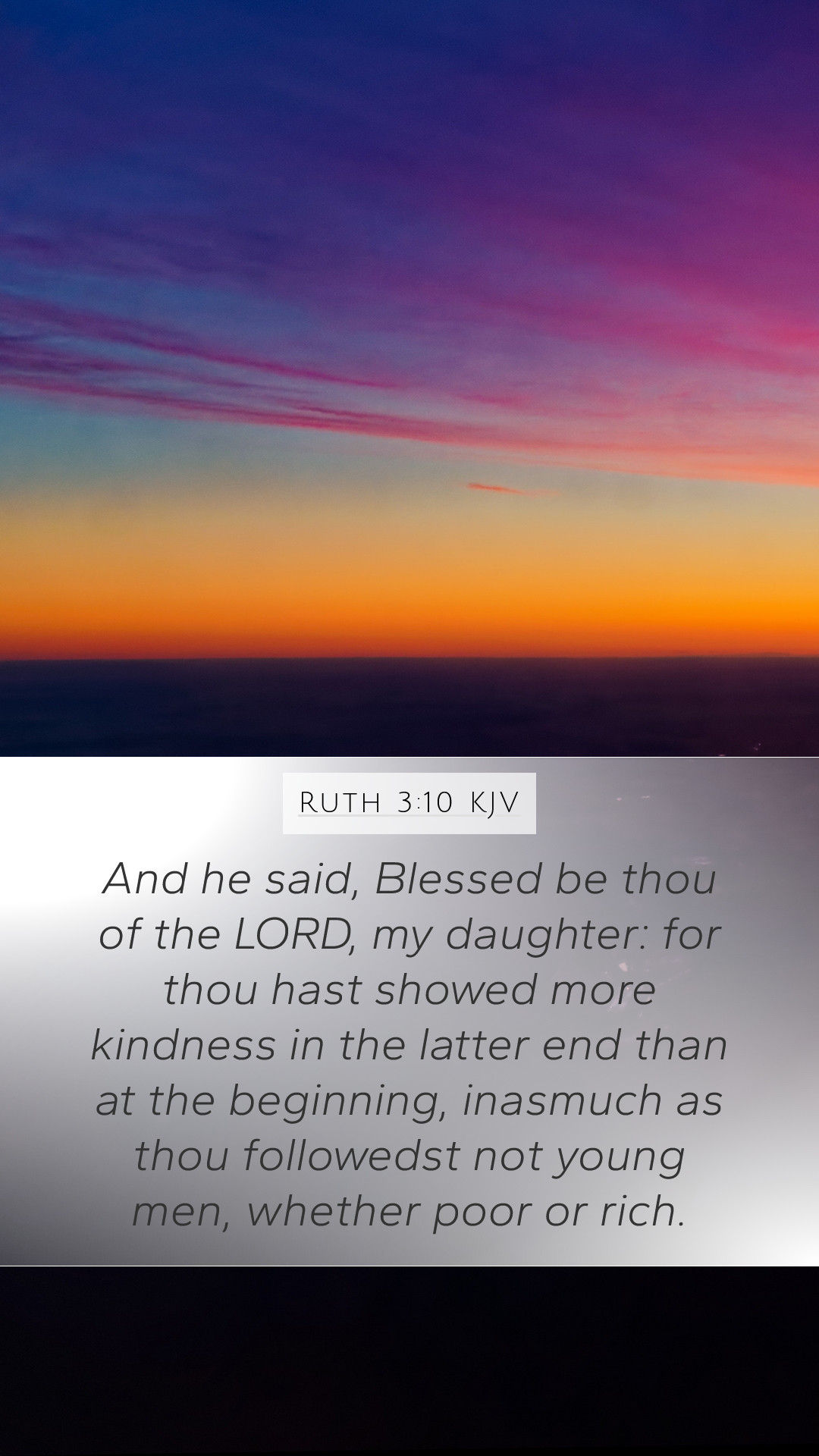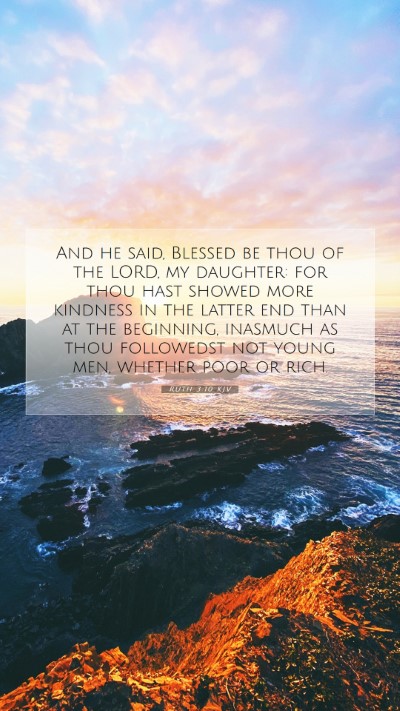Old Testament
Genesis Exodus Leviticus Numbers Deuteronomy Joshua Judges Ruth 1 Samuel 2 Samuel 1 Kings 2 Kings 1 Chronicles 2 Chronicles Ezra Nehemiah Esther Job Psalms Proverbs Ecclesiastes Song of Solomon Isaiah Jeremiah Lamentations Ezekiel Daniel Hosea Joel Amos Obadiah Jonah Micah Nahum Habakkuk Zephaniah Haggai Zechariah MalachiRuth 3:10 Meaning
What is the meaning of Ruth 3:10?
And he said, Blessed be thou of the LORD, my daughter: for thou hast showed more kindness in the latter end than at the beginning, inasmuch as thou followedst not young men, whether poor or rich.
Ruth 3:10 Bible Verse Meaning
Bible Verse Meaning and Commentary for Ruth 3:10
Ruth 3:10 states: "And he said, Blessed be thou of the Lord, my daughter: for thou hast showed more kindness in the latter end than at the beginning, inasmuch as thou followedst not young men, whether poor or rich."
The verse presents a significant moment in the narrative of Ruth and Boaz, reflecting themes of kindness, loyalty, and divine blessing. Let's delve into the meanings and interpretations offered by various public domain commentaries.
Understanding the Context
Ruth, a Moabite widow, has chosen to remain with her Israelite mother-in-law, Naomi, after both of their husbands have died. This contrasts with the common expectations of her time, demonstrating her loyalty and commitment to Naomi and to the God of Israel.
Commentary Insights
- Matthew Henry: He comments on Ruth's actions as a profound example of kindness. Henry emphasizes how Ruth has exhibited loyalty not only to Naomi but also to the customs and laws of Israel. By not pursuing young men, Ruth showed that her focus was on fulfilling her familial duty, showcasing her character and virtue.
- Albert Barnes: Barnes highlights the significance of Boaz's response, which acknowledges Ruth's virtuous character. He notes that Ruth's choice to stay loyal despite her circumstances underscores the biblical notion of faithful love. Boaz’s blessing serves as a reflection of God’s favor upon Ruth for her selflessness and dedication.
- Adam Clarke: Clarke provides historical context, explaining the cultural implications of Ruth's actions. He notes that her refusal to pursue wealth or youth signifies a higher moral standard. Clarke elaborates on the blessings Boaz pronounces, pointing to the righteousness of God being displayed through human actions of kindness and loyalty.
Theological Significance
Ruth 3:10 reveals profound theological insights into God’s providence and human agency. The verse illustrates how God honors and blesses acts of kindness and loyalty. Ruth’s actions are framed as exemplary in the eyes of Boaz, suggesting that true character is recognized and rewarded in the realm of divine favor.
Implications for Modern Readers
For those engaged in Bible study groups or participating in online Bible study, Ruth 3:10 serves as a rich text for discussion. It calls for reflection on how we demonstrate kindness and loyalty in our own lives, echoing how these qualities can lead to divine blessings.
Application of the Verse
Understanding this scripture can inspire believers to lead lives characterized by love and kindness towards others, reflecting the teachings of Jesus. It poses the question: How can we apply the principles of loyalty and selflessness in our daily interactions?
Related Bible Cross References
- Ruth 1:16-17: Ruth's commitment to Naomi is highlighted.
- Proverbs 31:10-31: The qualities of a virtuous woman are discussed.
- Matthew 5:7: Blessed are the merciful, for they shall obtain mercy.
Conclusion
This verse encapsulates the essence of loving kindness and the rewards it brings. For those seeking a deeper understanding of Scripture, Ruth 3:10 provides a clear example of how God honors faithful actions and virtuous living.


